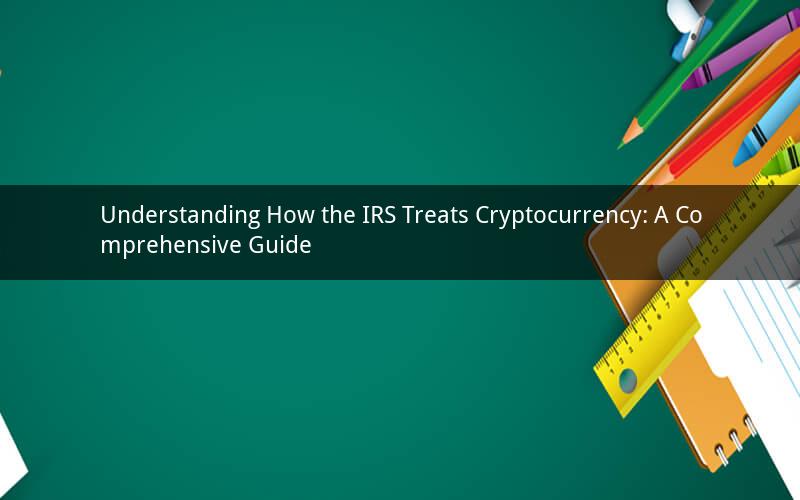
Introduction:
The rise of cryptocurrency has brought about a new era of digital finance, and with it, a host of regulatory challenges. One of the most pressing questions for individuals and businesses alike is how the Internal Revenue Service (IRS) treats cryptocurrency. This guide will delve into the IRS's stance on cryptocurrency, exploring the various aspects of its tax treatment and providing insights into compliance and reporting requirements.
I. Cryptocurrency as Property:
The IRS views cryptocurrency as property for tax purposes, meaning it is subject to capital gains tax. This classification has significant implications for individuals and businesses that hold, trade, or use cryptocurrency.
A. Capital Gains Tax:
When individuals sell or exchange their cryptocurrency for fiat currency or other cryptocurrency, they must report the transaction and pay capital gains tax on any profit. The tax rate depends on the holding period of the cryptocurrency, with short-term gains taxed at the individual's ordinary income tax rate and long-term gains taxed at a lower rate.
B. Cost Basis Determination:
Determining the cost basis of cryptocurrency is crucial for calculating capital gains tax. The IRS provides various methods for determining cost basis, including the first-in, first-out (FIFO) method and the specific identification method.
C. Wash Sale Rule:
The IRS has implemented the wash sale rule, which prevents taxpayers from recognizing a loss on the sale of a security if they purchase a "substantially identical" security within 30 days before or after the sale. This rule also applies to cryptocurrency, so individuals should be cautious when trading or selling their assets.
II. Tax Reporting Requirements:
Complying with the IRS's tax reporting requirements for cryptocurrency is essential for individuals and businesses. Here are some key aspects of tax reporting:
A. Form 8949:
Individuals and businesses must complete Form 8949 to report cryptocurrency transactions. This form is used to calculate the cost basis and determine the gain or loss on each transaction.
B. Schedule D:
After completing Form 8949, taxpayers must transfer the information to Schedule D of their tax return to calculate their overall capital gains or losses. Schedule D is used to determine the total tax liability related to cryptocurrency transactions.
C. Form 1040:
Individuals must report their cryptocurrency transactions and the resulting gains or losses on Form 1040. This form provides a summary of the taxpayer's income, deductions, and credits, including any cryptocurrency-related information.
III. Reporting Virtual Currency Mining Income:
For individuals who mine cryptocurrency, it is crucial to understand that mining income is taxable. The IRS considers mining income as self-employment income, subject to self-employment tax, as well as income tax.
A. Self-Employment Tax:
Individuals who mine cryptocurrency must pay self-employment tax, which covers Social Security and Medicare taxes. The tax rate is based on the individual's net earnings from self-employment.
B. Reporting Mining Income:
Mining income must be reported on Schedule C (Form 1040) or Schedule F (Form 1040), depending on whether the mining activity is considered a business or a hobby.
IV. Reporting Virtual Currency Payments to Employers:
Employers who pay their employees in cryptocurrency must report these payments to the IRS. Here are the key points to consider:
A. Form W-2:
Employers must issue a Form W-2 to employees who receive cryptocurrency payments. This form reports the total amount paid in cryptocurrency, as well as the fair market value of the cryptocurrency on the date of payment.
B. Form 941:
Employers must report the value of cryptocurrency paid to employees on Form 941, the quarterly employment tax return. This form includes the income tax, Social Security tax, and Medicare tax withheld from the employee's cryptocurrency payments.
V. Reporting Virtual Currency Transactions on International Transactions Report (Form 114):
U.S. taxpayers who engage in cryptocurrency transactions with foreign entities may be required to report these transactions on Form 114, also known as the Foreign Bank and Financial Accounts (FBAR) form. This form is used to disclose foreign financial accounts and transactions exceeding certain thresholds.
Conclusion:
Understanding how the IRS treats cryptocurrency is vital for individuals and businesses to ensure compliance with tax laws. By recognizing cryptocurrency as property, the IRS has imposed capital gains tax on transactions, along with specific reporting requirements. This guide has provided an overview of the tax treatment of cryptocurrency, including reporting obligations and the potential impact on mining income and international transactions. Taxpayers should consult with a tax professional to ensure accurate and compliant reporting.
Questions and Answers:
1. Q: Does the IRS require individuals to report cryptocurrency transactions that resulted in a loss?
A: Yes, individuals must report all cryptocurrency transactions, including those that resulted in a loss. However, the IRS allows taxpayers to deduct losses up to $3,000 per year, with any remaining losses carried forward indefinitely.
2. Q: Can I deduct expenses related to cryptocurrency mining?
A: Yes, taxpayers can deduct expenses related to cryptocurrency mining if the mining activity is considered a business. These expenses may include electricity costs, equipment depreciation, and other mining-related expenses.
3. Q: Do I need to report cryptocurrency transactions that I made on a foreign exchange platform?
A: Yes, if you engage in cryptocurrency transactions with foreign entities, you may be required to report these transactions on Form 114, the Foreign Bank and Financial Accounts (FBAR) form. It is essential to consult with a tax professional to determine if you need to file this form.
4. Q: Can I contribute cryptocurrency to a traditional IRA?
A: No, as of the knowledge cutoff date in 2023, the IRS does not allow cryptocurrency contributions to traditional IRAs. However, you may be able to contribute cryptocurrency to a self-directed IRA, which is a type of IRA that allows for alternative investments.
5. Q: How can I determine the fair market value of cryptocurrency for tax purposes?
A: The fair market value of cryptocurrency can be determined by referencing a reputable cryptocurrency exchange or platform. It is important to use the value on the date of the transaction to accurately calculate the gain or loss for tax purposes.